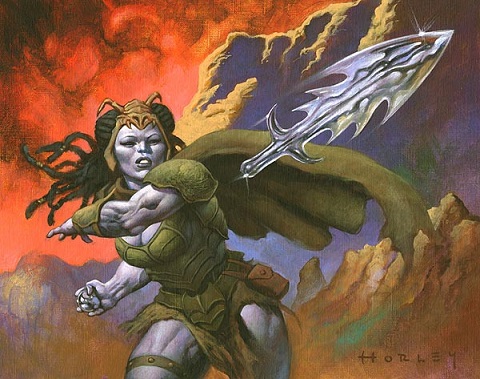
| Category | Races | ||||||
| Type | human sub-race grouping | ||||||
| Creation |
| ||||||
| Language | Nidurrâb | ||||||
| Native | Bal-Kriav |
The Khazarkar race is an amalgamation of three human sub-races. Each of the Khazarkar sub-races have different coloration, deep bronze for the Corralum, gray and dark shades for the Terrant and light purple for the Minâth.
Khazarkars were illegally created in 260 GE by a Lith-Crillion better known today as Set. His reason for making them was to build a worshiper base, leading to Ascencion. In Otriring, Set imposed regimentation on his creations, with the Minâth served by the Terrant and the Corralum.
Three centuries in Otriring came to an end in 255 LE. Trackers under Danzar-Khâl caught up with the thief, discovering his illegally created people in the unfair advantages offered by Otriring. As punishment, Set's environmental changes at Otriring were to be undone, the area made uninhabitable.
From the perspective of the Higher Powers, letting lose 20,000 Khazarkars was a much debated issue. At the Hall of Edicts, Danzar-Khâl, Athena, and Ares voted that they be allowed to remain on the world Bal-Kriav. It was counter to the recommendation of the Sphere Oversight Division, who's models showed the Khazarkar's temperament as one to cause problems in the future.
Driven from Otriring, the Khazarkar began the rebuilding of their civilization on the edges of Klak-tak. Four decades later, on 2 Warper 292 LE, thanks to Khazarkar worship, their creator Set passed into the Temple of Ascension, becoming a Cult Power.
In 1512 HE, the Khazarkars were driven north by the Hive Swarms ravaging what would become better known as the Hive Region. They passed through Gwaelergoth into the southern tracts of Gulimbor. Over the next three centuries, Khazarkar civilization declined. They regressed into tribes led by family groups. In a constant state of conflict, competing for resources and numbers, alliances were formed by marriages. These marriages of the most influential and powerful resulted in the elite families. Since the time of the Kingdom of Belkazim (250 - 275), these elite families, the Minâth-Nôrî, have held a considerable influence on the direction of the Khazarkar Empire.
Like the governments of the past, the Minâth are responsible for appointing positions. There are no voting rights for the Terrant and the Corralum. The Minâth write the laws and define the social customs. The others follow, or take the crack of the whip.
- Zibanalêth, Corralum rebel of Khimilêth - "A Caste Society"
In the First Epoch, the finding of the Agêrdul, a sentient item, led to a language change. Shamans, then the authority figures, were the first to learn this language. Over several generations, they convinced or forced the language of Nidurrâb on the populace. Their previous language, Old Khazarkar as it came to be known, was largely lost after three generations.
In the Gulimbor Cataclysm (996 - 1203), the Khazarkars were again on the move. Most went far north to Cinazan. There after a civil war, they established the Second Khazarkar Empire.
Sociology
Khazarkars of the First Khazarkar Empire and the Second, have a haughtiness about them that comes from long indoctrination.Non-Khazarkar are to serve the supreme race and be enlightened to the ways of the righteous.
- Anâth Kazanîr, sociologist of the Phâte Ubrî, Second Epoch - "Superior Beliefs"
This idea of superior blood led to the Khazarkar Purity Edict. In the Khazarkar Empire, racial purity is a principle and a law. Half-Khazarkar are hunted down and executed. Even the failure to report one, results in stiff sentences and fines. Not seriously enforced outside the capital, religious decrees of the Pharzîmrâth forbid interracial relationships.
All Khazarkars, whether from the imperial types of the Khazarkar Empire or from some island home like Mechantus, have a trait called Danzar-Khâls Sanction. Placed on the Khazarkars by Danzar-Khâl, it was one of the punishments doled out to Set for theft and use of a rod of creation. This trait affects each Khazarkar caste differently. The Corralum, normally the worker caste, were given a better chance of bluffing, or as Lukoon would say "an advantage when dealing with your superiors"; meaning the Minâth. The Terrants, the soldier caste, were given mental fortitude - to counter deception of the mind. The Minâth, sometimes called the vain caste, were dealt a blow, made more susceptible to charm.
Khazarkar Castes
There are three breeds, or castes, of Khazarkar. In the Khazarkar Empire, there is a pecking order based on your skin color. The highest caste are purple skinned, the Minâth. The Terrant are those of metallic skin and serve as the warrior caste. The last lot is the bronze-skinned, the Corralum, serving as the worker caste. Outside the Khazarkar Empire, this caste system is not followed. Those of Khimilêth left the empire because of it and the empire's monotheism.Related Information
Tribes
- Bathil
- Tânul
- Tamrazân